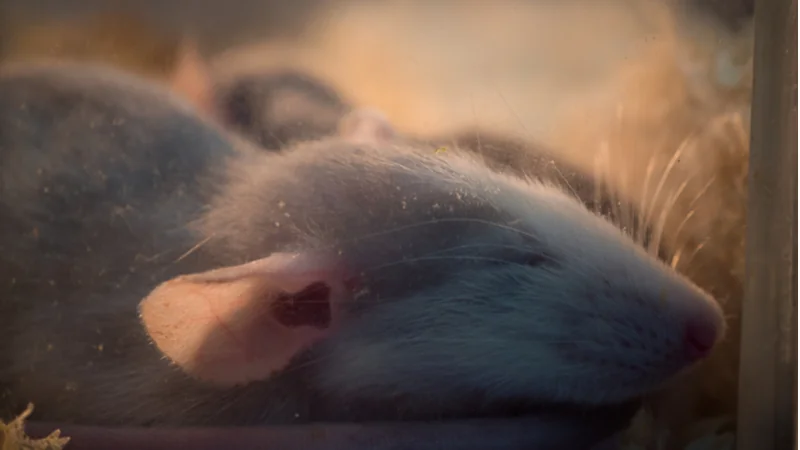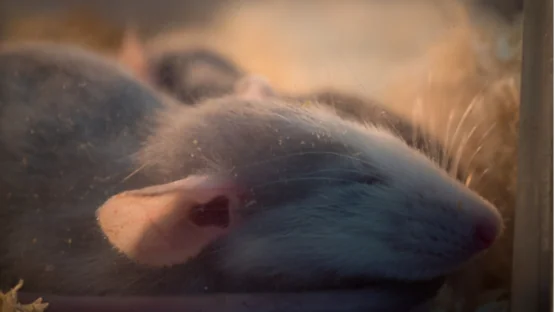Publishing in the journal Aging, a team of Russian researchers has shown what happens to the cognitive capabilities and brain structures of young and old sleep-deprived mice.
Sleep-deprived mice act somewhat like sleep-deprived people
This experiment used three groups of mice, each of which had two sub-groups of younger and older animals. One group did not undergo any water maze-related training, a second group was exposed to a water maze along with other physical challenges, and a third group was subjected to sleep deprivation along with the water maze.
Young mice actually had certain functions of their memory improved with sleep deprivation, and they were more willing to explore a larger area. Instead of simply crossing a large area, they took time to peek in holes, a behavior that was only somewhat recapitulated in the older mice. The researchers hypothesize that this was due to their increased anxiety, which made them more eager to escape.
Older sleep-deprived mice exhibited behaviors demonstrating cognitive impairment. While they actively searched for a platform in a water maze experiment, they were confused, switching directions frequently and forgetting what they had learned in past experiments.
The effects on weight were also significant. Despite being well-fed, young sleep-deprived mice gained very little weight. On the other hand, older sleep-deprived mice significantly gained weight. In general, the researchers observed an agitated emotional state in sleep-deprived mice.
Changes in neurons and function
One of the most striking results of this experiment is that sleep-deprived mice had shrunken neurons compared to both the trained and untrained mice, and their synaptic connections were degraded as a result. In younger mice, this degradation was actually accompanied by intense neurogenesis. Older mice, however, were unable to generate nearly as many new neurons.
The team also measured two molecular markers of stress: hypoxia-inducible factor 1 (HIF1) and perilipin 2 (PLIN2). Surprisingly, neither of these markers was affected by long-term sleep deprivation. However, PLIN2 was dramatically increased in older mice, and the researchers note that PLIN2 is an important marker for assessing age-related brain changes.
DNA methylation, in the aggregate, was substantially affected by sleep deprivation. Although the researchers did not model which genes were the most affected, they showed that sleep-deprived young mice had less overall methylation than either of the other groups and that sleep-deprived older mice had even less.
The mitochondria were also substantially affected. Possibly due to their sedentary lifestyle, young mice that were not doing water mazes nor sleep deprivation had a higher basal oxygen consumption rate, more respiration, and less mitochondrial activity than their active counterparts. However, young, sleep-deprived mice had respiratory and mitochondrial numbers more like those of their sedentary counterparts.
Older mice experienced different results. In older mice, respiratory numbers were similar between the inactive and active groups. However, their mitochondria were less active. Paradoxically, many of the numbers relating to respiration and mitochondrial activity were closer in sleep-deprived mice to those of young mice, but the researchers believe that they signify reduced resistance to stressors.
Conclusion
It is well-known that sleep deprivation and circadian rhythm disruption have negative effects and that sleep deprivation and stress are related [1]. The researchers note that chronic sleep deprivation is, itself, often the product of age-related changes.
One thing is very clear with this study: sleep is critical to brain health. Long-term sleep deprivation causes significant damage to brain structures. While this is, as usual, only a mouse experiment, if our brain cells respond similarly to those of mice, pulling all-nighters to study is a poor and self-defeating decision.
Literature
[1] Nollet, M., Wisden, W., & Franks, N. P. (2020). Sleep deprivation and stress: a reciprocal relationship. Interface focus, 10(3), 20190092.



